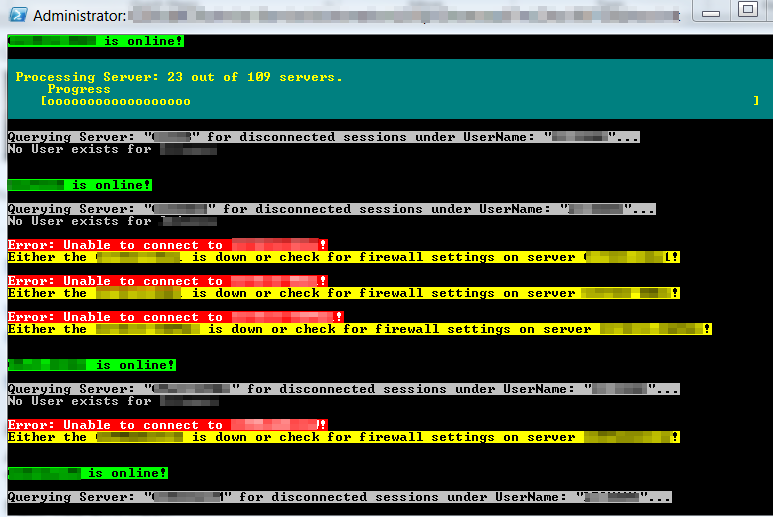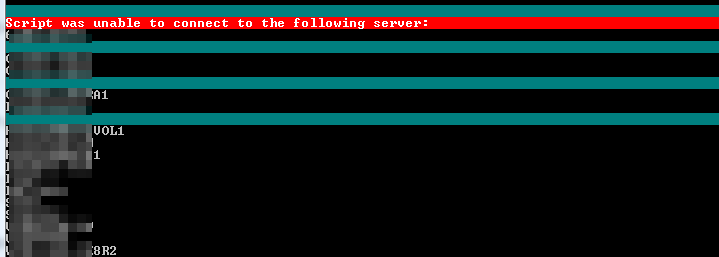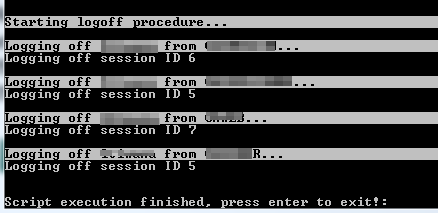Powershell pour découvrir la session RDP déconnectée et se déconnecter en même temps
y a-t-il un script qui peut déconnecter ma session RDP déconnectée de n'importe quel serveur? Cela provoque beaucoup de douleur et des lock-out constants ad compte.
toute aide serait géniale.
1 réponses
j'ai la réponse et j'écris cette réponse pour aider quelqu'un dans le besoin car je devais comprendre cela moi-même. J'ai créé un script en utilisant des ressources en ligne pour trouver des sessions RDP déconnectées sur tous les serveurs Windows dans mon environnement publicitaire. J'exécute une requête sur chaque serveur Windows et crée une liste formatée par CSV, j'utilise ensuite cette liste pour déconnecter mon ID de ces serveurs, de sorte que je n'ai pas de sessions déconnectées.
j'ai fait ça pour m'assurer que mon compte AD ne soit pas verrouillé en raison de certaines sessions RDP déconnectées quand il est temps de changer mon mot de passe.
Vous êtes libre de modifier ce script selon votre besoin.
le code de Script est ci-dessous:
param (
#get current logged on username
[string]$UserName = $env:USERNAME
)
# Import the Active Directory module for the Get-ADComputer CmdLet
Import-Module ActiveDirectory
# Query Active Directory for enabled windows servers computer accounts and sort by name
$Servers = Get-ADComputer -Filter {(OperatingSystem -like "*windows*server*") -and (Enabled -eq "True")} | Sort Name
# Initiating variables
$SessionList = $NULL
$queryResults = $NULL
$SError = $null
$SDown = $null
$z = 0
# Get total number of servers
$count = $Servers.count
# Start looping through each server at a time
ForEach ($Server in $Servers) {
# initiate counter for showing progress
$z = $z + 1
$ServerName = $Server.Name
# Start writing progress
Write-Progress -Activity "Processing Server: $z out of $count servers." -Status " Progress" -PercentComplete ($z/$Servers.count*100)
# check if server is pingable before running the query on the server
if (Test-Connection $Server.Name -Count 1 -Quiet) {
Write-Host "`n`n$ServerName is online!" -BackgroundColor Green -ForegroundColor Black
Write-Host ("`nQuerying Server: `"$ServerName`" for disconnected sessions under UserName: `"" + $UserName.ToUpper() + "`"...") -BackgroundColor Gray -ForegroundColor Black
# Store results in array
[array]$queryResults += (
# Query server for specific username
query user $UserName /server:$ServerName |
foreach {
# Look for lines with Disc string to filter out active sessions
if ($_ -match "Disc") {
# format the output in CSV by replacing more than 2 spaces with a comman
write-output ("`n$ServerName," + (($_.trim() -replace ' {2,}', ',')))
}
}
)
}
# If server is not pingable show error message
else {
# Make list of server that are down.
[array]$SDown += ($ServerName)
Write-Host "`nError: Unable to connect to $ServerName!" -BackgroundColor red -ForegroundColor white
Write-Host "Either the $ServerName is down or check for firewall settings on server $ServerName!" -BackgroundColor Yellow -ForegroundColor black
}
}
# If there are some non pingable server then display the list
if ($SDown -ne $null -and $SDown) {
Write-Host "`nScript was unable to connect to the following server:" -ForegroundColor White -BackgroundColor Red
$SDown
}
# Check if any disconnected session are stored in the array
if ($queryResults -ne $null -and $queryResults) {
# Convert the CSV fromat to table format with headers
$QueryResultsCSV = $queryResults | ConvertFrom-Csv -Delimiter "," -Header "ServerName","UserName","SessionID","CurrentState","IdealTime","LogonTime"
# Show the results on console
$QueryResultsCSV |ft -AutoSize
# Go through each Disconnected session stored in the array
$QueryResultsCSV | foreach {
# Grabb session ID and ServerName
$Sessionl = $_.SessionID
$Serverl = $_.ServerName
# Show message on the console
Write-Host "`nLogging off"$_.username"from $serverl..." -ForegroundColor black -BackgroundColor Gray
sleep 2
# Logout user using session ID
logoff $Sessionl /server:$Serverl /v
}
}
else {
# if array is empty display message that no session were found
Write-Host `n`n`n`n("*" * $LineSize)
Write-Host "You are all good! No ghost sessions found!" -BackgroundColor Green -ForegroundColor Black
Write-Host ("*" * $LineSize)
}
# Pause at the end so you can capture the output
$null = Read-Host "`n`nScript execution finished, press enter to exit!"
Screenshots:



